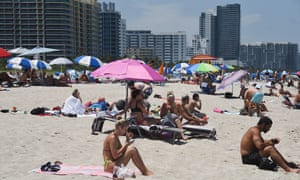Covid-19 cases are now growing quickly in some rural and exurban areas with strong Trump support

Photograph: Michele Eve Sandberg/Rex/Shutterstock
Skepticism among some Republicans about the real threat of the coronavirus pandemic, that may have been influenced by racial attitudes, could shift as positive cases of infection are now climbing in areas with strong support for Donald Trump, research suggests.
Vulnerable populations in rural, conservative-leaning areas of the country, meanwhile, where health infrastructure is poor and public spending on health is low, could face increasing risks from Covid-19 at a time when job losses have led millions to lose health insurance.
A well-documented partisan split in attitudes about coronavirus emerged in the early months of the pandemic. Republican men were less likely to wear protective masks than other groups, and Republicans were more likely to say their states were moving too slowly to reopen their economies.
The discrepancy was attributed to factors including support for Trump, who downplayed the coronavirus threat, and even to gender differences in health-related conduct.
But research suggests that racial attitudes, which strongly correlate with party affiliation in the United States, might also have reinforced an empathy gap for the early victims of Covid-19, who were disproportionately African American.
A white Republican state senator from Ohio recently expressed that gap in shocking terms at an official hearing this week. “Could it just be that African Americans, the colored population, do not wash their hands as well as other groups?” the official, Steve Huffman, said in remarks captured on video.
Jody Armour, a University of Southern California law professor and author of the forthcoming N*gga Theory: Race, Language, Unequal Justice, and the Law, said: “One of the dominant kinds of discrimination today is actually unconscious indifference toward people who don’t look like you, who are outside your in-group.”
“When people are looking at out-group members, at an unconscious level, they don’t have the same level of care and concern for them, they don’t have a panic of empathy for them when they see them in distress.”
Leonie Huddy, a professor of political science at Stony Brook University in New York, said that Trump’s message to supporters downplaying coronavirus had a racial subtext.
“Very much under the surface is a sort of winking and nodding about the fact that the African American community has been more heavily affected,” Huddy said. “And so there’s a bit of, you know, ‘Maybe we’re OK’, because Trump’s supporters are largely white.”
“Trump’s not going to say that out loud, that’s a little too much even for him, but he’s good at alluding to that kind of thing.”
In the early stages of the pandemic, African Americans died of Covid-19 at three times the rate of white people, according to figures compiled by the non-partisan APM Research Lab. Only 21% of Covid-19 deaths by late May were recorded in counties won by Trump in 2016, according to a New York Times analysis.
But coronavirus cases are now growing quickly in some rural and exurban areas with strong Trump support. Covid-19 cases are climbing in Arizona, Florida, South Carolina and Arkansas, and in Texas hospitalizations for Covid-19 are up 42% since Memorial Day.
A relative lack of health infrastructure in parts of rural America and economic devastation from the Covid-19 closures mean that already vulnerable communities could be overwhelmed. Older, rural voters in Republican-led states that declined to expand Medicaid under the Affordable Care Act are more likely to lack health insurance than the urban poor, according to a 2018 study.
Residents of rural areas tend to be older and sicker than their urban counterparts, according to the Centers for Disease Control, and they have longer travel distances to specialty and emergency care. The intensive care unit beds needed to ventilate critical Covid-19 patients are unequally distributed across the country.
Public attitudes can confound predictions based on race and income level. White non-college grads, a group that broke 64-28 for Trump in the 2016 election, think that protests about the police killing of George Floyd are “mostly legitimate” by a 51-39 margin, according to Marist polling.
But conservative political beliefs have been found to correlate with reliance on federal aid in states such as Kentucky, where residents counted on the federal government for at least 40% of their personal income in 28 out of 120 counties, as of 2014.
Conservatives can both disproportionately rely on social welfare programs and oppose such programs owing to inaccurate perceptions about whom the programs benefit – perceptions once again informed by race, Huddy said.
“I think that people that live in some of these areas would be surprised to find that in fact their area is a major recipient of federal transfer from more Democratic states to more Republican states,” said Huddy. “I think it would be surprising information to them. But that is the reality.”




